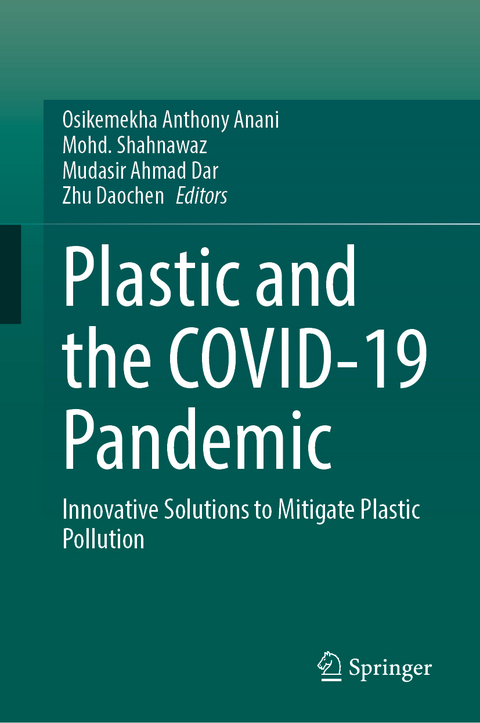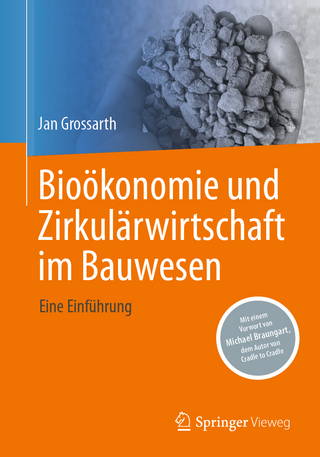
Plastic and the COVID-19 Pandemic
Springer International Publishing (Verlag)
978-3-031-74768-7 (ISBN)
- Noch nicht erschienen - erscheint am 25.12.2024
- Versandkostenfrei innerhalb Deutschlands
- Auch auf Rechnung
- Verfügbarkeit in der Filiale vor Ort prüfen
- Artikel merken
From masks and face shields through at-home tests and sanitizer bottles, many of the tools we used to keep safe during the global COVID-19 pandemic had two things in common: first, they were at least in part made of plastic, and second, they were disposable. But what was the fate of all of the plastics that we used throughout the pandemic, and how has the management of plastic waste changed in the COVID years? This book showcases the research findings and to unravel the current scenario of plastic pollution due to the ongoing COVID-19 pandemic and goes on to report innovative ways to mitigate increasing plastic pollution beyond personal protective equipment (PPE). Through twelve chapters, this volume offers a cutting-edge overview the impact of COVID-19-associated plastic pollution in environmental and economic terms. It also analyzes the effects of plastic waste on human health.
Dr. Osikemekha Anthony Anani is a Senior lecturer in the Department of Animal and Environmental Biology, Delta State University Abraka Delta State, Nigeria. His academic qualifications are B.Sc. (Ed.) (Hons.) Biology and Education (2006) in the prestigious Delta State University Abraka, MSc. Environmental Quality Management (2013), and Ph.D. Environmental Quality Management (2017) in the respected University of Benin, Benin City both in Nigeria. His areas of proficiency are pollution studies, ecotoxicology, ecology, forensic and aquatic biology, hydrobiology, benthology, malacology, ecological and health risk valuation, and conservation of plants and animals. Dr. Anani has over 100 peer-reviewed scientific publications in international and national scientific journals. 11 presentations at local and international conferences. 66 Scopus papers and over 12 Web of Science. He leads a research group in the laboratory for hydrobiology and ecotoxicology at the same university which focuses on environmental sustainability and pollution monitoring. Dr. Mohd. Shahnawaz is currently working as an Assistant Professor on contract basis at Government Degree College Drass, A constituent College of University of Ladakh, Ladakh, India, India. In 2022-23 session, he worked as an Assistant Professor on contract basis at the Department of Botany, University of Ladakh, Kargil Campus, Khumbathang, Kargil, Ladakh UT, India. In 2021, he got selected as an Associate Professor at Biofuel Institute, School of the Environment and Safety Engineering, Jiangsu University, Zhenjiang, China. In 2020, he got selected as a postdoc fellow at Yeungnam University, South Korea. He has several years of teaching and postdoctoral research experience. Dr. Shahnawaz worked on diverse fields of life sciences: viz. Tissue culture of medicinal plants, genetic diversity assessment medicinal plants using high resolution molecular marks, enhancement of Plant secondary metabolites contents and, biodegradation of plastic. He completed his M.Phil. (2010) and PhD (2016) from the Department of Botany, Savitribai Phule Pune University, Pune, Maharashtra, India. He is recipient of various fellowships awarded by the SPPU (M.Phil. and PhD stipend), UGC-BSR (Meritorious Fellowship), UGC-MANF (JRF/SRF), and DST-SERB (NPDF). His research interest is in Ecology, Microbiology, Plastic Bioremediation, Plant Biotechnology, Plant Secondary Metabolites, Drug Discovery and Integrative Medicine. He has served as a reviewer and editor for several international journals and had received the Young Scientist Award (2019) from VDGood Professional Association at Vishakhapatnam, India. He has published 25 research articles, 19 book chapters and 13 books of international repute with 1200 plus citations. Dr. Mudasir Ahmad Dar is working as an Associate professor, at Jiangsu University, P.R. China. Dr. Mudasir Dar has extensive theoretical knowledge and operating experience related to host-microbe interactions in insects including termites. He is pioneering in elucidating the mechanism of lignocellulose degradation in different gut-regions of insects and snails. He has more than 8 years of research experience related to gut-microbiome analysis in Insects, snails and termites. He is currently working on the biofuel production from lignocellulosic wastes by using gut symbiotic bacteria of termites. He has more than 40 papers published in peer-reviewed international-indexed journals of high repute. He is a recipient of many national and international research grants such as Research Fund for International Young Scientists, National Natural science Foundation of China, China Postdoctoral Organization, etc. He is serving as an Editorial board member of many journals including BMC Microbiology besides acting as a reviewer of several high quality, peer-reviewed international journals such as Environmental technology and innovation, Bioenergy research, Comparative biochemistry and physiology-C, Environmental science and pollution research, Archives of Microbiology, to name a few. He is a rank holder of many national and international awards such as CSIR-UGC-NET with All India Rank 41 and 101 conducted by the CSIR-HRDG Govt. of India. He is a recipient of many Fellowships like Maulana Azad National Fellow, UGC-UPE phase II fellow, etc. He has a well-documented multidisciplinary research background from gut-microbiology to environmental biotechnology with a critical problem-solving approach. Dr. Daochen Zhu is currently working as a Professor at Biofuel Institute, School of the Environment and Safety Engineering, Jiangsu University, Zhenjiang, China. Previously he had served as an Associate Professor and Assistant Professor at the same University. He has earned his Ph.D. in Environmental Biochemistry from Kobe University, Japan (2008). He has completed his B.S. in Fermentation Engineering from Dalian Polytechnic University, China (2004). During the tenure of his career, he also worked at Washington State University, USA, as a Visiting Scholar (2015–2016). He is a recipient of numerous awards and funding, which support his research at Jiangsu University, China. Dr. Zhu is a recognized guide for M.S. students. He is a reviewer and editorial board member of various peer-reviewed journals of international repute. His research group mainly focuses on microorganism resource and diversity, lignin biodegradation and chemicals product, and biodegradation of organic pollutants. He is also interested in the mitigation of microplastic through bioremediation technology. Dr. Zhu has 50 peer-reviewed publications, 12 patents, and 4 book chapters and 4 edited books to his credit with international repute.
Chapter 1: Nexus Between Population Growth and Plastic Wastes: Generation of Positive and Negative Effects Under Covid-19 Pandemic Era.- Chapter 2: The Impact of Covid-19 Lockdown On The Production And Control of Plastics.- Chapter 3: Current Methods In The Management And Disposal of Plastic Wastes During Covid-19 Pandemic.- Chapter 4: Current And Future Biodegradable Plastic Polymers In The Covid-19 Era.- Chapter 5: Plastic Recycling Effects and The Sudden Banning of Bags During The Covid 19 Pandemic Period.- Chapter 6: Impact of Plastic Packaging On Waste Accumulation And Global Tax Regimes To Mitigate The Plastic Pollution: Multifaceted Crisis And Sustainable Solutions.- CHAPTER 7: Enduring Impacts of Plastic Bags And Their Implications On Global Tax Laws Following The Covid-19 Pandemic Lockdown.- Chapter 8: Impact of Covid 19 Pandemic On The Environmental Management Processes-3r's (Reduce, Reuse And Recycling) of Plastic Wastes.- Chapter 9: The Role of International Trade And Corporation In The Improvement of Plastic Management.- Chapter 10: Impact of Plastic Wastes Generated During Covid-19 Pandemic On Population Health And Well Being.- Chapter 11: Policies To Reduce And Redesign The Use of Personal Protective Materials And Other Plastic Materials Under The Covid-19.- Chapter 12: Efficiencies In The Circular Economy In Plastic In Different Countries of The World Under Covid-19 Pandemic Era.- Chapter 13: Challenges And Perspectives For Mitigating The Footprints of Plastic Wastes Produced By Covid-19 Pandemic.- Chapter 14: Regulations, Initiatives, And Legislation Regarding The Management of Plastic Waste.
| Erscheint lt. Verlag | 25.12.2024 |
|---|---|
| Zusatzinfo | Approx. 300 p. |
| Verlagsort | Cham |
| Sprache | englisch |
| Maße | 155 x 235 mm |
| Themenwelt | Naturwissenschaften ► Biologie ► Ökologie / Naturschutz |
| Naturwissenschaften ► Geowissenschaften | |
| Schlagworte | COVID Pandemic • Face mask pollution • Personal protective equipment • plastic material • Plastic pollution • Plastic Waste Management • Sanitizer bottles |
| ISBN-10 | 3-031-74768-2 / 3031747682 |
| ISBN-13 | 978-3-031-74768-7 / 9783031747687 |
| Zustand | Neuware |
| Haben Sie eine Frage zum Produkt? |
aus dem Bereich


